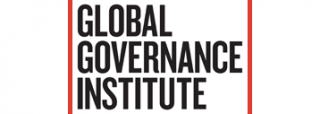World Order: The Return of the Rest
13 March 2024
Prof Amitav Acharya joined us on 12 March to discuss the key features of the emerging 'multiplex' world order.

In a keynote lecture delivered on 12 March 2024 at the Global Governance Institute, Professor Amitav Acharya of American University in Washington D.C. presented a thought-provoking analysis on the evolving landscape of global governance and the shifting dynamics of world power. His talk, titled ‘World Order: The Return of the Rest’, delved into the transition from a unipolar world dominated by American hegemony to what he terms a ‘multiplex world’ — a concept distinct from the traditional notion of multipolarity.
Professor Acharya’s argument challenges the conventional wisdom of an enduring liberal international order, led by the United States and characterised by its promotion of liberal values and norms. Despite claims that this liberal order would persist indefinitely, incorporating rising powers like China and India, Acharya suggests that such a hegemonic system is now evidently on the decline. Instead, we are witnessing the emergence of a world order that eschews the dominance of any single nation or the conventional balance-of-power politics among great powers.
What sets a multiplex world apart from a multipolar one is its emphasis not just on power dynamics but on the importance of ideas, norms, and diverse types of interactions at multiple levels. This approach accounts for the influence of a wide array of actors, including regional powers, non-state entities, corporations, and social movements. These actors contribute to international affairs through various mechanisms beyond mere power balancing, utilising institutions, norms, and economic interdependence to manage global order.
Acharya further highlighted the Eurocentric nature of the multipolar framework and contrasted it with the multiplex world’s embrace of different civilizational experiences. He pointed out that while Europe historically relied on a balance of power for security, other regions developed different systems, such as Asia's hierarchical model or the Indian Ocean model and its vast commercial and cultural networks. This diversity in governance and interaction models is a cornerstone of the emerging multiplex world, which values deep connectivity alongside cultural diversity and political autonomy.
Observations on the current state of global governance reveal a decline in traditional Western hegemony, marked by inconsistencies in U.S. leadership and challenges to the unity of the Atlantic community. The rise of the Global South, notably China and India, and their increasing share in global GDP, underscores a shift towards a more economically dynamic and diplomatically active bloc of countries. This shift is accompanied by a burgeoning of South-South links and a pluralization of global governance, with new institutions and regional mechanisms emerging outside the purview of established multilateral frameworks.
Professor Acharya's lecture provided a compelling vision of a world moving away from Eurocentric and state-centric models of order towards a more complex, interconnected, and diversified global governance structure. This multiplex world, with its emphasis on a variety of actors and interactions, offers a fresh perspective on how future advancements in diverse areas of governance from security to trade and marine biodiversity conservation might unfold.
As we ponder the implications of this transition, it becomes clear that understanding and navigating the multiplex world will require innovative approaches to diplomacy, policy-making, and international cooperation. The lecture not only challenges us to rethink our assumptions about global order but also invites us to consider the possibilities and responsibilities that come with this profound transformation.
 Close
Close


